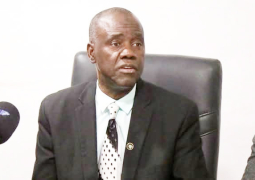
In attendance were ECOWAS member states. Mr. Darboe in his keynote address expressed privilege to deliver the keynote address at the current African Tax Outlook validation meeting.
“On behalf of ATAF member countries and Heads of Revenue Administration in Africa, I wish to seize this opportunity to commend the leadership at the ATAF Secretariat for initiating this laudable project,” he said. “The ATO publications, which seeks to provide valuable, practical and relevant information on tax administration in Africa is a giant step in actualising our aspiration as a continent in providing African solutions to African problems.”
“Since its inception in 2016, the ATO publication has been received across the continent with acclaim and this fact can be seen from the incredible growth in the number of participating countries. A total number of 17 countries have joined the initial 15 countries that participated in the first edition in 2016.”
“I am proud to inform you that The Gambia was a participant in the very first edition, a move approved by my humble self as Commissioner General.”
“Thus, the call to deliver this keynote address at this year’s ATO validation meeting is indeed a meeting with destiny.”
“When I received the request from Mr. Logan to deliver this keynote address at this occasion, it occurred to me that ATAF is asking a seasoned Customs officer to deliver an address to tax professionals. As some of you may be aware, I started my career as a Customs officer in the erstwhile Department of Customs and rose through the ranks to become Deputy Commissioner General in 2012 and eventually the Commissioner General in 2015 after the creation of Gambia Revenue Authority in 2004.”
“In 2020, the global economy was hit by the coronavirus pandemic, which almost crippled the entire global economy, and whose economic ramifications are still affecting economies around the world. For countries like The Gambia that rely heavily on revenue from the tourism industry, the travels restrictions imposed to curb the pandemic significantly affected revenue receipt from the tourism industry. Before the pandemic, the tourism industry contributed 5% of our domestic revenue receipt in 2019 and this declined to1% in 2021.”
“As economies around the globe were trying to recover from the pandemic, a host of factors conspired to further dampen any hopes of recovery. The global supply chain crisis, the outbreak of the Russia-Ukraine war and the slow recovery from the coronavirus pandemic have all worsened the economic outlook for 2023.”
“Among these, however, the ongoing war between Russia and Ukraine has been more impactful on the economies of developing countries than the impact of the pandemic. The war has sent gas prices to the roof resulting in governments across the world, especially in Africa, paying huge subsidies to stabilise gas prices and curb inflation. I am aware of the ongoing debate amongst economists in many African countries, including The Gambia, on the desirability or otherwise of continuing the unsustainable subsidy on petroleum. However, that will be a debate for another day.”
“The factors just mentioned should send Africa into a deep reflection to bring us to the realisation that our economies are extremely fragile and events outside our continent can have such a huge impact on the lives of our people.”
“I am not a prophet of doom, but things might even get worse as the July 2022 World Economic Outlook projects global growth to slow from an estimated 6.1 percent in 2021 to 3.2 percent in 2022, moderating to 2.9 percent in 2023. This is lower than projected in the April 2022 World Economic Outlook update by 0.4 and 0.7 percentage points respectively. The downgrade largely reflects the negative projection for global inflation, which is expected to push central banks across the world to tighten monetary policies.”





